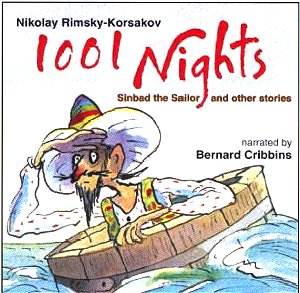Look at the cover of this disc and you can see there is no
mention of the title of the musical work on which it is based. Rimsky-Korsakovís
symphonic suite Sheherazade, inspired by Tales of Arabian
Nights, was not intended to be performed with spoken commentary.
This is no Peter and the Wolf. Yet Naxos have chosen to market
the disc on the strength of verbal story telling potential, thus playing
down the fact that it contains a very fine performance of a colourful
orchestral repertory piece. I assume the aim is to target a childrenís
Christmas market.
Bearing this in mind I will start with the commentary
which takes up well over half the disc time-wise. The four stories that
are told before each movement are chosen according to a programme that
Rimsky-Korsakov was persuaded to release for an early performance. He
regretted this later because, as he explains in his memoirs, the music
was composed with the Arabian Nightsí general atmosphere
of exotic fairy-tale in mind rather than any particular story. Having
said that, he did make specific reference to Sinbad the Sailor and the
sea, and the recurring solo violin intentionally represents Sheherazade
as the story teller. On the disc there is an introduction that sets
the scene and explains the threatening circumstances that surround the
telling of the tales.
I confess I have never enjoyed a performance of Sheherazade
so much. The reason being that the commentary effectively sucked
me into the fairy tale world that Rimsky-Korsakov intended I should
go. It felt like a regression to childhood but the experience was none
the worse for that. I like Bernard Cribbins' rendering very much. It
is a no-nonsense approach that can generate tension where necessary
without any histrionics, nor, I am glad to say, any thespian-style over
exaggerated diction which is often the plague of this kind of accompaniment.
Thank goodness Ian Richardson isnít doing it.
As for the music, the Philharmonia is in crack world-class
form both collectively and individually in a work that abounds in instrumental
solos. Bátiz has a rather exaggerated way with his sforzandi
and staccati, so punchy at times that the flow of the music is threatened
and this is compounded by close recording, particularly of the wind
solos (I could hear the key pads clatter on the oboe). At times I yearned
for a more wallowing string sound, especially in the wonderful nautical
undulations of the first movement. These personal reservations aside,
this is a performance (including David Nolanís excellent extended violin
solos) to compare with any and has sound to match.
What Naxos does not come clean about anywhere in the
booklet or on the disc itself, is that this is a recycled performance
of Sheherazade recorded eight years ago. It was admired
then and was unquestionably a bargain buy. And so it remains. If you
just want it for the music you can cue the disc accordingly. If you
want to regress into the faraway, fairy tale land of the Arabian Nights
with words and music then Bernard Cribbins is your man.
John Leeman

![]() Narrated by Bernard Cribbins
Narrated by Bernard Cribbins
![]() NAXOS 8.555889 [79:07]
NAXOS 8.555889 [79:07]